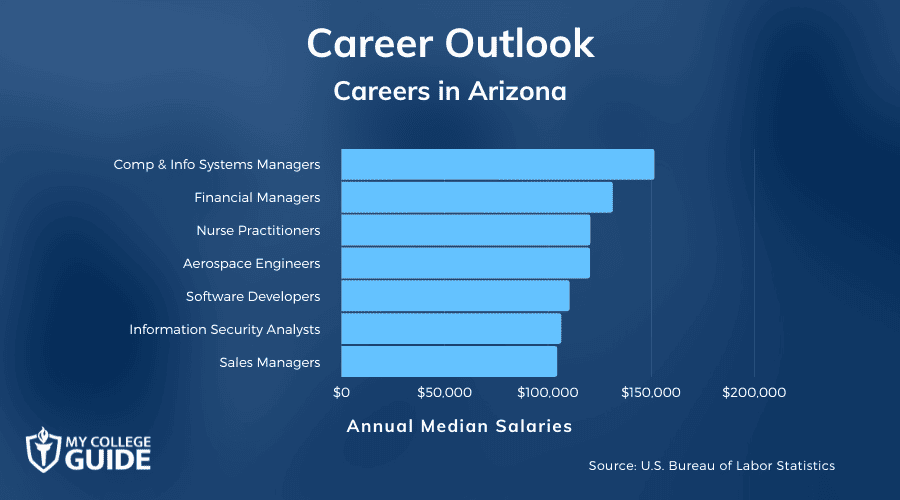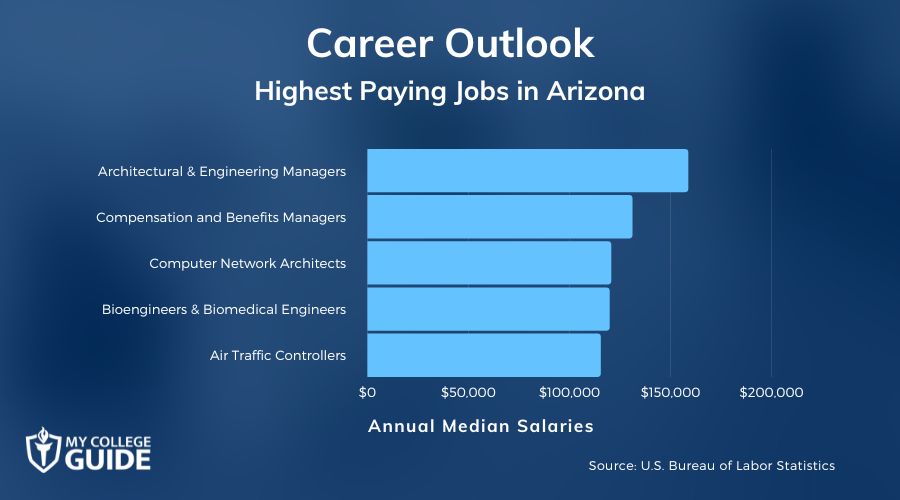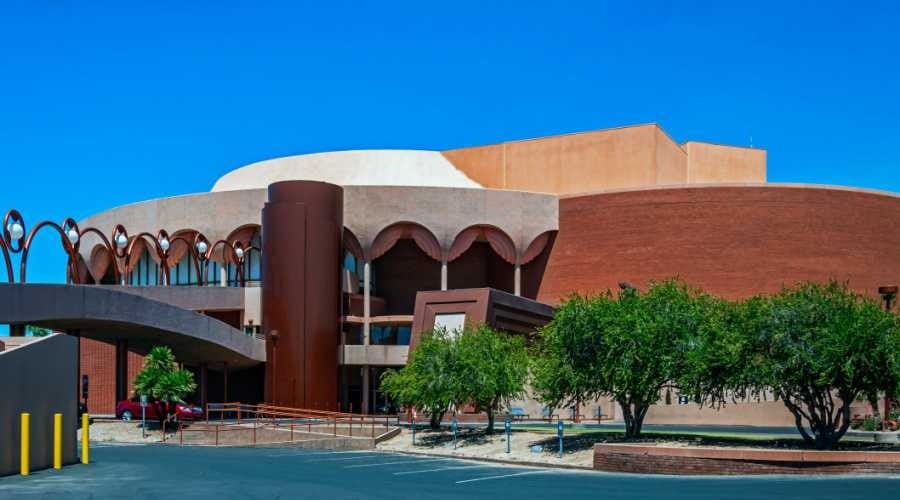There is a wide variety of online colleges in Arizona for students to continue their education.

Through organizations like Arizona Technology in Education Association (AzTEA), the state has focused on the integration of technology in all aspects and at all levels of education. This has provided a solid foundation for online learning at the post-secondary level.
Editorial Listing ShortCode:
With this emphasis on the future, Arizona continues to be a top choice for many people seeking a college degree.
Online Colleges in Arizona

Arizona is one of the nation’s leaders in online education. There are many online community colleges in Arizona and many other colleges that offer a variety of degrees at all levels.
According to the National Center for Education Statistics (NCES), approximately 51% of students in Arizona are enrolled exclusively in distance education courses. On top of that, another 20% are enrolled in a hybrid of on-campus and online courses.
Editorial Listing ShortCode:
Arizona offers various accredited online colleges that offer learning opportunities from certificates to doctoral degrees in in-demand fields.
An online degree in Arizona appeals to a wide variety of learners. Some of these may include adults returning to college, individuals with medical conditions, those with children, people who need to maintain full-time jobs, and others that require the flexibility of online learning.
Arizona is a member of the Western Interstate Commission for Higher Education (WICHE), which is a collaboration of 16 states focused on innovation and resource sharing.
The WICHE enables qualifying students to enroll in degree programs in any of the participating states, including Arizona online colleges, and territories, for no more than 150% of the in-state tuition rate.
Common Online Degrees in Arizona

Arizona online universities offer many popular and versatile online degrees. These are some common degree fields you may find and what they typically entail:
- Accounting: An online accounting degree can help prepare you for a career in business or finance. Common topics of study are business law, economics, federal taxation, and forensic accounting. After you earn a bachelor’s or master’s degree in accounting, you may become a licensed accountant by passing the Certified Public Accountant (CPA) exam.
- Aerospace Engineering: Arizona has a booming aerospace and defense industry, which makes aerospace engineering a popular major. This degree explores the methods and theories used to design and test aircraft and spacecraft. Coursework typically includes math and science subjects, such as aerodynamics, calculus, flight dynamics, and orbital mechanics.
- Business Administration: This interdisciplinary degree can help you qualify for a broad range of corporate careers. It typically covers foundational business approaches, skills, and theories and includes courses in a variety of fields, like accounting, human resources, management, and marketing.
- Criminal Justice: This degree explores law and the criminal justice system. Classes are commonly taken in criminology, law, psychology, and sociology. Graduates with criminal justice degrees can pursue careers in homeland security, law enforcement, and social justice agencies.
- Registered Nursing: You may prepare for a career in healthcare by earning a registered nursing (RN) degree. This program often includes courses in clinical theory, nursing fundamentals, pharmacology, and women’s and infant health. Registered nurses work in many healthcare settings, including hospitals, nursing homes, physicians’ offices, and rehabilitation centers.
These common online degrees can help set you up for professional success and help you secure a preferred position.
Overview of Higher Education in Arizona

Arizona is home to 62 degree-granting institutions, according to the NCES. Of those schools, 26 are public institutions, 10 are non-profit, and 26 are for-profit.
The NCES also reports that the average cost of tuition and fees at Arizona’s 4 year public institutions for in-state students is $11,410 per year, which is above the national average. The average cost for out-of-state students is $25,426, which is a bit lower than the national average.
Employment Outlook for College Graduates in Arizona

Graduates from online universities in Arizona can enter a growing job market. The U.S. Bureau of Labor Statistics states that Arizona employs over 3 million people.
Some of the top-employed industries in the state are:
- Office and administrative support
- Sales
- Transportation and material moving
- Food preparation and serving
Other common occupations in Arizona include those in the business and financial operations field, management occupations, healthcare practitioners, and educational occupations.
Data from the Bureau of Labor Statistics shows that the average annual salary in Arizona is $45,280. Workers across all occupations earn a median hourly wage of $21.77.
Careers & Salaries in Arizona

Students who graduate from Arizona online universities can pursue positions in a wide variety of industries. Many high-paying occupations require only a bachelor’s degree.
Tech is one of the fastest-growing sectors in Arizona and other states. Employers need skilled professionals to build, maintain, and use computers and other technologies. Arizona’s healthcare industry is also expanding, leading to more job openings for many occupations.
According to U.S. Bureau of Labor Statistics (BLS) data, these are the median annual salaries for ten common careers in Arizona.
| Careers | Annual Median Salaries |
| Computer and Information Systems Managers | $151,490 |
| Financial Managers | $131,310 |
| Nurse Practitioners | $120,470 |
| Aerospace Engineers | $120,270 |
| Software Developers | $110,390 |
| Information Security Analysts | $106,370 |
| Sales Managers | $104,370 |
| Medical and Health Services Managers | $102,940 |
| Computer Hardware Engineers | $101,280 |
| Public Relations Managers | $96,280 |
Many factors, such as your employer, location, education, or work experience, can impact job availability and median salaries.
Editorial Listing ShortCode:
You may increase your chances of securing a preferred position by earning additional certifications and exploring job openings outside your immediate geographic area.
Online Arizona Colleges Admissions Requirements

All online colleges in AZ have individual admissions processes, but these are a few common application materials you may need to submit:
- ACT or SAT scores (only some schools require them)
- Personal statement
- Resume or curriculum vitae
- Transcripts from your previous educational institutions
Additionally, most schools will require you to complete an online application and pay a fee. Some schools offer fee waivers for qualifying students. You can contact a program’s admissions office or visit the college’s website for specific admissions criteria.
AZ Online Colleges Accreditation

As you explore online universities in Arizona, you likely want to prioritize regionally accredited institutions. Schools receive regional accreditation if they pass a formal peer review by an independent accrediting organization. Accreditation provides quality assurance for a school’s educational programs.
Choosing an accredited online college has several advantages. Employers often favor job candidates from accredited universities, which can give you a competitive edge in the job market. Also, many financial aid opportunities are only available to students enrolled at accredited institutions.
You can visit the Council for Higher Education Accreditation (CHEA) website to verify a school’s accreditation status.
Financial Aid and Scholarships

College costs can be alarming, but in Arizona, there is a tremendous amount of financial assistance available. To discover the aid you qualify for, you can start by filling out the Free Application for Federal Student Aid (FAFSA).
You can access the application on October 1 of the year before you plan to attend college. The FAFSA opens the door to loans, grants, and scholarships from the US government, Arizona, and many schools.
A common type of financial aid is through grants and scholarships, which do not have to be paid back as long as they are used properly.
Arizona residents have exclusive access to the following grants to supplement their federal aid:
- Math, Science, and Special Education Teacher Loan Forgiveness Program (MSSE): This is a need-based forgivable loan for students who plan to pursue teaching. Accepted students agree to teach in an Arizona public school for a term equal to the number of years they receive the loan, plus one year. It provides up to $7,000 per year.
- Arizona Leveraging Educational Assistance Partnership (AzLEAP): This provides a need-based grant of up to $2,500 a year for students who demonstrate substantial financial need, as determined by the FAFSA.
There are also need-based and merit-based grants and scholarships available through each of Arizona’s institutions. To find out how to apply for these, simply contact the financial aid office at the school or schools you’re interested in.
Editorial Listing ShortCode:
Additional scholarships are available based on things like race, religion, gender, athletic or artistic abilities, unusual talents, intended major, and so on. Here are just a few scholarships that are open to Arizona residents:
- AWS John C. Lincoln Memorial Scholarship: $3,500
- Flinn Foundation Scholarship: Up to $120,000 value to cover tuition, fees, room and board, and at least 2 travel abroad experiences
- Rocky Mountain Coal Mining Scholarships: $1,000-$2,750
To find more scholarships that may be open to you, you can check out scholarship search sites like Fastweb.com. This site will ask you to enter some basic demographic information in order to match you up with scholarship opportunities.
Arizona Online Education Resources

There are several free online resources that may provide support as you research Arizona online colleges, including:
- Arizona Commission for Postsecondary Education: This website has a comprehensive career guide and lists financial aid resources available to Arizona students.
- Arizona Private Postsecondary Education: This organization oversees Arizona’s private educational institutions. You can research schools, learn about policies governing private Arizona colleges, and file complaints on this site.
- College Goal Arizona: This initiative helps high schoolers apply to college and provides resources for locating financial aid.
These valuable resources can teach you more about specific Arizona online university options and financial assistance options.
How Much Does It Cost to Go to an Online College in Arizona?

Many factors can impact the cost of attending online colleges in Arizona, including your residency, enrollment status, and the type of school you choose.
According to the National Center for Education Statistics, in-state students who attend public 4 year universities in Arizona pay an average of $11,410 a year in tuition and fees. Out-of-state students pay an average of $25,426 for the same schools.
The average cost of tuition and fees at a private 4 year school in Arizona is $13,108 a year.
In-state students pay an average of $2,160 each year at public 2 year institutions in Arizona, while out-of-state students pay $6,927, on average.
Tuition Breaks for Out-of-State Students

Many Arizona online universities accept students from across the United States. Before you enroll, it’s beneficial to check that your home state has a reciprocity agreement with Arizona. State reciprocity means that colleges can offer online education to out-of-state students without complying with state-specific regulations.
Students from neighboring states may also be eligible for in-state tuition rates or other discounts. Arizona is a member of the Western Interstate Commission for Higher Education.
Institutions that belong to this organization have agreed to allow qualifying out-of-state students to attend at a maximum cost of 150% of in-state tuition. This deal helps students from eligible states save money while attending online universities in Arizona.
Editorial Listing ShortCode:
However, you may need to pay additional distance learning fees for your online classes. These fees typically apply to all online students, not just out-of-state attendees.
What Jobs Are in High Demand in Arizona?

Many careers in Arizona are in high demand as healthcare and other industries expand. According to the Arizona Commerce Authority, here are five occupations that are expected to experience rapid growth over the next decade along with their projected growth rates.
- Solar photovoltaic installers: 5.9%
- Nurse practitioners: 5.7%
- Occupational therapy assistants: 4.8%
- Medical and health services managers: 4.2%
- Information security analysts: 3.9%
Some of the most in-demand careers may require additional education beyond a bachelor’s degree. For example, you must complete a graduate degree to become a nurse practitioner. Investing in graduate studies may lead to more job prospects and a higher salary.
What Are the Highest Paying Jobs in Arizona?

Graduates from online colleges in Arizona can earn high salaries in many occupations. According to the Bureau of Labor Statistics, here are five of the top-paying careers in the state and their median annual salaries:
- Architectural and Engineering Managers: $158,720
- Compensation and Benefits Managers: $131,100
- Computer Network Architects: $120,600
- Bioengineers and Biomedical Engineers: $119,810
- Air Traffic Controllers: $115,420
The annual wages for these occupations have been calculated by multiplying the median hourly wage by a full-time, year-round hours figure of 2,080 hours. Specific earnings depend on a variety of factors, including location, employer, education, and work experience.
List of Online Colleges in Arizona
Methodology: The following school list is in alphabetical order. To be included, a college or university must be regionally accredited and offer degree programs online or in a hybrid format.

Arizona Christian University offers a Christian liberal arts education. With 6 start dates each year, ACU aims to work with students’ busy schedules.
Minors, associate degrees, and bachelor’s degrees can be pursued online. Fields of study offered include business administration, biblical and theological studies, education, and more.
Arizona Christian University is accredited by the Higher Learning Commission.

Arizona State University’s online program aims to help students succeed in their career goals. Its online assistant even helps prospective students choose a concentration.
ASU offers over 300 online programs, including undergraduate degrees, graduate degrees, and certificates, in fields such as digital photography, architecture, and tourism. Courses are 6 to 7.5 weeks long.
Arizona State University is accredited by the Higher Learning Commission.

Arizona State University–Downtown Phoenix offers both undergraduate and graduate-level degree programs in a wide range of fields.
Programs are offered in areas such as journalism and mass communication, nursing, public service, global management, sciences, and the arts. Honors college programs are also commonly available, and classes often provide flexible scheduling options.
Arizona State University – Downtown Phoenix is accredited by the Higher Learning Commission.

Arizona State University–Tempe offers undergraduate degree programs in areas such as media and communication, teaching and education, architecture and construction, business, computing, and mathematics.
Most programs offer flexible online learning options that also typically provide access to labs and facilities on campus.
Arizona State University – Tempe is accredited by the Higher Learning Commission.

Arizona State University–West offers over 125 degree programs at both the undergraduate and graduate levels. Possible undergraduate majors include business and finance, engineering, teaching and education, nursing, and several more.
ASU’s courses are designed to blend the liberal arts with practical skills for workforce preparation.
Arizona State University – West is accredited by the Higher Learning Commission.

Embry-Riddle Aeronautical University—Prescott was ranked the number one regional college in the West by U.S. News and World Report. The school’s online programs have multiple start dates spaced across the year. Online courses are taken in terms that are 9 weeks long.
ERAU offers STEM associate, bachelor’s, master’s, and doctoral degrees in fields like aviation maintenance, homeland security, and more.
Embry-Riddle Aeronautical University – Prescott is accredited by the Southern Association of Colleges and Schools Commission on Colleges.

Grand Canyon University is a private college with a Christian focus, although it accepts students of all faiths. GCU works with students’ schedules by offering rolling admission and weekly start dates.
GCU offers associate, bachelor’s, and master’s degrees in fields like Christian studies, film, business administration, and more.
Grand Canyon University is accredited by the Higher Learning Commission.

Northern Arizona University offers two methods of online learning: traditional and personalized. Traditional learning follows a semester schedule and includes deadlines. Personalized learning allows students to start at any time and work at their own pace.
NAU offers bachelor’s, master’s, and doctoral degrees in areas of study like global business, family science, computer science, paramedic care, and more.
Northern Arizona University is accredited by the Higher Learning Commission.

Ottawa University offers six terms throughout the year. Each term is 8 weeks long. Its online programs are designed specifically for working adults.
OU offers a variety of certificate, undergraduate, and graduate programs in fields such as gerocounseling, computer science, education, and more.
Ottawa University is accredited by the Higher Learning Commission.

Phoenix Seminary offers online graduate degree options in biblical and theological studies, Christian studies, and Ministry. Courses are usually asynchronous and typically allow the viewing of recorded lectures at any time.
Courses are usually 16 weeks long in the fall and spring semesters and 10 weeks long in the summer terms.
Phoenix Seminary is accredited by the Higher Learning Commission.

Prescott College’s programs are designed to strike a balance between structure, to keep students on track, and flexibility, to help students continue with their other responsibilities.
The programs are offered online and can be completed anywhere with an internet connection. Many programs do have community outreach components. Prescott offers certificates, bachelor’s degrees, and master’s degrees in fields such as adventure education, social justice, and more.
Prescott College is accredited by the Higher Learning Commission.

Sonoran University of Health Sciences offers an online Master of Science in Clinical Nutrition and an online Executive Master of Science in Nutrition Business Leadership. Supervised experiences may be available while completing coursework in a self-paced format.
Courses are designed to teach a holistic approach to healthcare and nutrition.
Sonoran University of Health Sciences is accredited by the Higher Learning Commission.

The University of Advancing Technology offers undergraduate and graduate programs in technology fields. Courses are completed in 5 week modules with three classes per module, totaling 15 hours per week. Most courses use asynchronous learning formats.
The school offers programs in fields of studies like game design, network security, software engineering, and technology innovation.
The University of Advancing Technology is accredited by the Higher Learning Commission.

The University of Arizona was ranked #7 for online bachelor’s degrees by the U.S. News and World Report. The school’s online courses are taught by the same faculty as those on campus, and online students can earn the same degrees as those offered by the same programs on campus.
Online programs offer 6 start dates a year, and classes are 7.5 weeks long. Areas of study offered include entrepreneurship, applied computing, and more.
The University of Arizona is accredited by the Higher Learning Commission.

The University of Phoenix is an entirely online university designed for learners who are already working or have families. New classes start every 5 to 6 weeks, and each one is 5 to 6 weeks long.
The school offers associate, bachelor’s, master’s, and doctorate degrees in fields such as criminal justice, behavioral science, healthcare, education, and more.
The University of Phoenix is accredited by the Higher Learning Commission.
Getting Your College Degree in Arizona Online

Arizona has demonstrated a strong commitment to online education. With an extraordinary selection of degree programs available at both public and private institutions and numerous grants and scholarships available, enrollment numbers continue to soar well above the competition.
Enrolling in an Arizona online degree program may have many advantages. These programs often offer more flexibility than traditional in-person schooling, allowing you to study at your own pace. You can also choose from a broad range of majors that may not be available at your local institutions.
If you live in a state that has a reciprocal agreement with Arizona, you may even qualify for reduced tuition rates.
Are you ready to continue your education? You may research accredited online Arizona colleges today to get started.
If you’re considering an online degree, Arizona is a great choice for many. You can also view our Online Colleges in Alaska and Online Colleges in Arkansas guides for more options.
